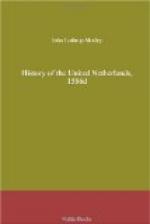In a financial point of view, England would certainly lose nothing by the union. The resources of the Provinces were at leant equal to her own. We have seen the astonishment which the wealth and strength of the Netherlands excited in their English visitors. They were amazed by the evidences of commercial and manufacturing prosperity, by the spectacle of luxury and advanced culture, which met them on every side. Had the Queen—as it had been generally supposed—desired to learn whether the Provinces were able and willing to pay the expenses of their own defence before she should definitely decide on, their offer of sovereignty, she was soon thoroughly enlightened upon the subject. Her confidential agents all—held one language. If she would only, accept the sovereignty, the amount which the Provinces would pay was in a manner boundless. She was assured that the revenue of her own hereditary realm was much inferior to that of the possessions thus offered to her sway.
In regard to constitutional polity, the condition of the Netherlands was at least, as satisfactory as that of England. The great amount of civil freedom enjoyed by those countries—although perhaps an objection—in the eyes of Elizabeth Tudor—should certainly have been a recommendation to her liberty-loving subjects. The question of defence had been satisfactorily answered. The Provinces, if an integral part of the English empire, could protect themselves, and would become an additional element of strength—not a troublesome encumbrance.
The difference of language was far, less than that which already existed between the English and their Irish fellow-subjects, while it was counterbalanced by sympathy, instead of being aggravated by mutual hostility in the matter of religion.
With regard to the great question of abstract sovereignty, it was certainly impolitic for an absolute monarch to recognize the right of a nation to repudiate its natural allegiance. But Elizabeth had already countenanced that step by assisting the rebellion against Philip. To allow the rebels to transfer their obedience from the King of Spain to herself was only another step in the same direction. The Queen, should she annex the Provinces, would certainly be accused by the world of ambition; but the ambition was a noble one, if, by thus consenting to the urgent solicitations of a free people, she extended the region of civil and religious liberty, and raised up a permanent bulwark against sacerdotal and royal absolutism.
A war between herself and Spain was inevitable if she accepted the sovereignty, but peace had been already rendered impossible by the treaty of alliance. It is true that the Queen imagined the possibility of combining her engagements towards the States with a conciliatory attitude towards their ancient master, but it was here that she committed the gravest error. The negotiations of Parma and his sovereign with the English court were a masterpiece of deceit on the part




